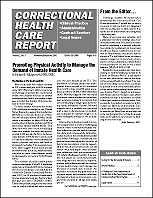Impact of New Therapeutics for Hepatitis C Virus Infection in Incarcerated Populations
Author: Anne C. Spaulding, MD, MPH.
Source: Volume 15, Number 03, March/April 2014 , pp.35-38(4)

< previous article |next article > |return to table of contents
Abstract:
Correctional populations represent about a quarter of this nation’s hepatitis C virus (HCV) case burden. HCV treatment often can be successful in correctional settings. With each new therapy, however, the course of treatment diminishes and the cost escalates ($75,000 for a 3-drug regimen). The pressure on correctional health care budgets is enhanced and treatment decisions become more complex. Prisoners have an Eighth Amendment guaranteed right to at least minimally adequate health care for their serious medical conditions. The first of a two-part series, this article examines the costs and benefits of instituting the newer HCV protease inhibitors and just where the choices fit constitutional mandates. In the second article, to appear in the May/June 2014 issue, the authors examine emerging and future therapies, screening practices and the policy implications of the various options. Co-Authors: Arthur Y. Kim, MD; Amy Jo Harzke, DrPH; Jean C. Sullivan, JD; Benjamin P. Linas, MD, MPH; Arthur Brewer, MD; Jeff Dickert, PhD; Barbara H. McGovern, MD; Lara B. Strick, MD, MSc; Robert Trestman, MD, PhD and Warren J. Ferguson, MD.Keywords: HCV protease inhibitors; direct-acting antivirals (DAAs)
Affiliations:
1: Emory University.